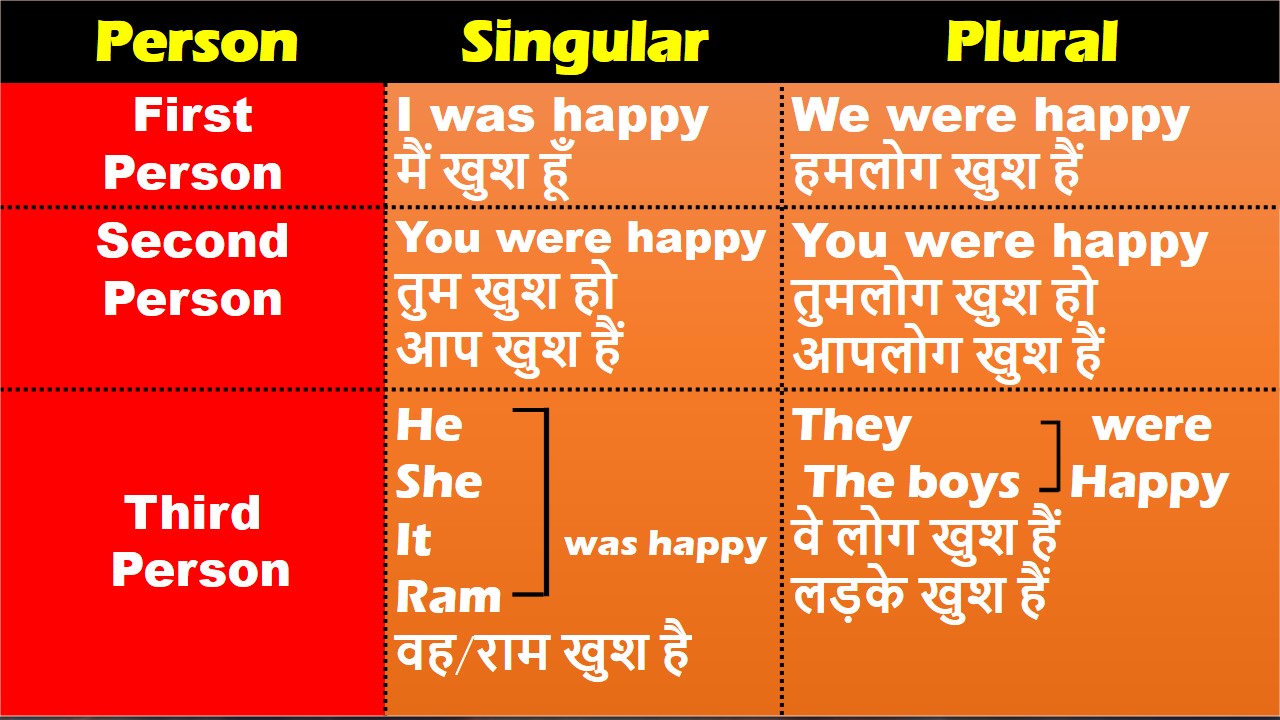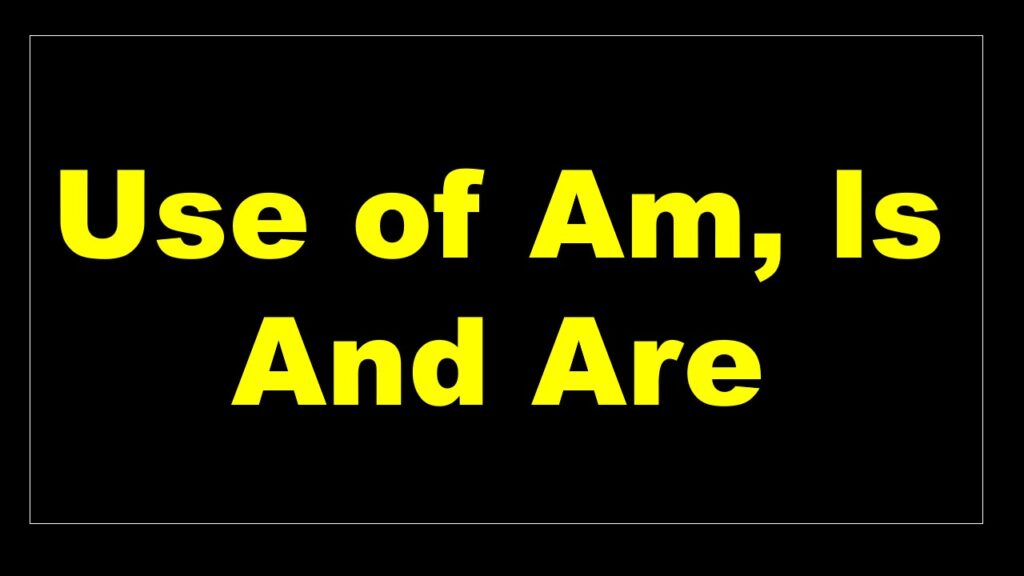जब वाक्य के अंत में हूँ, है, हो या ‘हैं’ मुख्य क्रिया के रूप में रहता है तब वाक्य के कर्ता के अनुसार am/is/are का प्रयोग होता है
Contents
- 1 TOPIC TO BE COVERED
- 2 Learning Chart of Am, ls & Are
- 3 Examples of Am, Is & Are 🙂
- 4 Use Of Am, ls & Are in Singular & Plural
- 5 POINTS TO REMEMBER
- 6 USE OF AM, IS & ARE IN NEGATIVE SENTENCES
- 7 USE OF AM, IS & ARE IN INTERROGATIVE SENTENCES
- 8 SENTENCE ENDING WITH ‘होता है’ ‘लगता है’ ‘रहता है
- 9 Use of Am, Is & Are in Negative & Interrogative Sentences
TOPIC TO BE COVERED
I. Introduction
II. Learning chart of Am, Is & Are
III. Use of Singular & Plural
IV. Negative Sentences
V. Interrogative Sentences
VI. Sentence ending With “होता है” “रहता है”
VII. Negative & Interrogative Sentences
VIII. Revisions
Learning Chart of Am, ls & Are


Examples of Am, Is & Are 🙂
- मैं खुश हूँ I am happy.
- हमलोग अमीर हैं We are rich.
- तुम / तुमलोग तैयार हो You are ready.
- आप/आपलोग खुश हैं You are happy.
- वह अच्छी है She is good.
- वह अच्छा है He is good.
- यह मजबूत है It is strong.
- सीता बीमार है Sita is ill.
- राम और मोहन अच्छे हैं
- Ram and Mohan are good.
- वे लोग तैयार हैं They are ready.
Use Of Am, ls & Are in Singular & Plural
- मैं एक विद्यार्थी हूँ I am a student.
- तुम एक गायक हो You are a singer.
- आप एक डॉक्टर हैं You are a doctor.
- वह एक गायिका है She is a singer.
- सीता एक नर्स है Sita is a nurse.
- हमलोग विद्यार्थी हैं We are students.
- आपलोग किसान हैं You are farmers.
- वे लोग शिक्षक हैं They are teachers.
- वे एक शिक्षक हैं He is a teacher.
- तुमलोग लड़के हो You are boys.
POINTS TO REMEMBER
यहाँ ध्यान दें कि कहाँ Singular Noun का प्रयोग हुआ है और कहाँ Plural Noun का । साथ-ही-साथ यह याद रखें कि Singular Noun के पहले a/an का प्रयोग हुआ है, जो आवश्यक है।
अतः आप ऐसा न लिखें
I am student.
They are student.
USE OF AM, IS & ARE IN NEGATIVE SENTENCES
अब ऐसे वाक्यों पर विचार करें, जो नकारात्मक (negative) हैं
मैं खुश नहीं हूँ
मैं डॉक्टर नहीं हूँ
ऐसे वाक्यों का अनुवाद करते समय am/is/are के बाद Not लगाना होता है।
Examples
- मैं बुरा नहीं हूँ I am not bad.
- तुम चालाक नहीं हो You are not clever.
- हमलोग पागल नहीं हैं We are not mad.
- राम गरीब नहीं है Ram is not poor.
- वे लोग ईमानदार नहीं हैं They are not honest.
- लड़के तैयार नहीं हैं The boys are not ready.
- राम और रवि उपस्थित नहीं हैं Ram and Ravi are not present.
- मैं डॉक्टर नहीं हूँ I am not a doctor.
- हमलोग किसान नहीं हैं We are not farmers.
- आपलोग अभियंता नहीं हैं You are not engineers.
USE OF AM, IS & ARE IN INTERROGATIVE SENTENCES
कुछ प्रश्नवाचक वाक्य ‘क्या’ से शुरू होते हैं
ऐसे वाक्यों का अनुवाद Subject के अनुसार Am/Is/Are से शुरू करें
Examples
- क्या मैं अंधा हूँ? Am I blind?
- क्या हमलोग गरीब हैं? Are we poor?
- क्या तुम बहरे हो? Are you deaf?
- क्या वह भूखा है? Is he hungry?
- क्या राम दोषी है? Is Ram guilty?
- क्या वे लोग बूढ़े हैं? Are they old?
- क्या बच्चे खुश हैं? Are the children happy?
- क्या मैं एक नौकर हूँ? Am I a servant?
- क्या आप हाकिम हैं? Are you an officer?
- क्या हमलोग किसान हैं? Are we farmers?
- क्या राम कवि है? Is Ram a poet?
SENTENCE ENDING WITH ‘होता है’ ‘लगता है’ ‘रहता है
अब हम ऐसे वाक्यों पर विचार करें, जिनके अंत में ‘होता है’ ‘लगता है’ ‘रहता है’ इत्यादि रहते हैं
ऐसे वाक्यों से जब किसी का स्वभाव सूचित हो, तब उनकी अँगरेजी am/is/are से बनेगी
Solved Examples
- मैं युवा और स्वस्थ हूँ। I am young and healthy.
- तुम धनी और दयालु हो। You are rich and kind.
- वे लोग थके और भूखे हैं। They are tired and hungry.
- मोहन और सोहन उदास हैं। Mohan and Sohan are sad.
- पिताजी तैयार हैं। Father is ready.
- माँ व्यस्त है। Mother is busy.
- बच्चे खुश हैं। The children are happy.
- घोड़े अच्छे हैं। The horses are good.
- सिंह बहादुर होता है। The lion is brave.
Note: milk, sugar, etc Uncountable Nouns हैं। अतः सामान्य अर्थ में इनके पहले the का प्रयोग नहीं होगा। यहाँ teachers और children के पहले भी the का प्रयोग नहीं होगा, क्योंकि जब Plural Noun से पूरी जाति का बोध होता है, तब इसके पहले the का प्रयोग नहीं होता है।
अब हम ऐसे वाक्यों पर विचार करें, जिनके अंत में होता है ‘लगता है’ ‘रहता है इत्यादि रहते हैं। ऐसे वाक्यों से जब किसी का स्वभाव सूचित हो, तब उनकी अँगरेजी am/is/are से बनेगी।
- दूध उजला होता है। Milk is white.
- दूध मीठा होता है। Milk is sweet.
- दूध लाभदायक होता है। Milk is useful.
- चीनी मीठी लगती है। Sugar is sweet.
- आदमी मरणशील होता है। Man is mortal.
- शिक्षक दयालु होते हैं। Teachers are kind.
- बच्चे नटखट होते हैं। Children are naughty.
- सूर्य गरम रहता है। The sun is hot.
Use of Am, Is & Are in Negative & Interrogative Sentences
- सोना काला नहीं होता है। Gold is not black.
- माँ क्रूर नहीं होती है। The mother is not cruel.
- बर्फ गर्म नहीं होती है। Ice is not hot.
- क्या दूध लाभदायक होता है? Is milk useful?
- क्या साधु दयालु होते हैं? Are saints kind?
- क्या बच्चे बुरे होते हैं? Are children bad?

